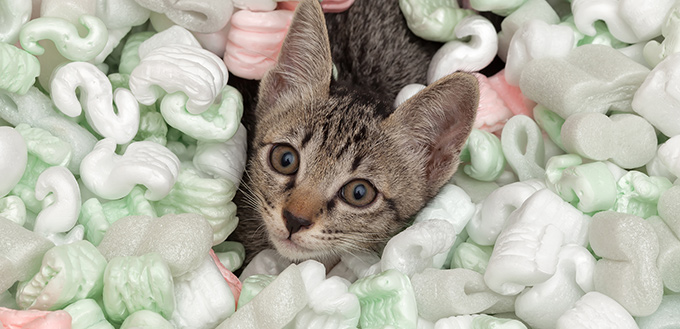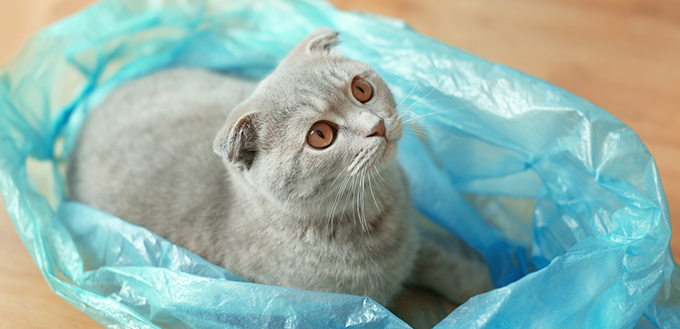When it comes to companion animals, it’s hard to imagine one more confusing and mysterious than cats.
As any cat lover out there knows, cats can be pretty weird and they tend to do things not even they seem to understand.
From staring at an empty wall for long stretches of time, suddenly losing control of their limbs, going from ‘love me’ to ‘attack attack”’ in the blink of an eye and their incorrigible obsession with boxes, cats can exhibit all kinds of oddball behaviors, but some of them are undoubtedly weirder than other.
One of such “too weird even for a cat” behaviors?
Eating plastic.
Eating or chewing plastic isn’t necessarily common in the sense that all cats do it, but it’s known to happen from time to time and, as you can imagine, it’s known to have some issues that go from owner annoyance to health problems for the cat.

Reasons Why Cats Eat Plastic?
Well, there are a number of reasons.
- Stress
Stress makes us all act a little weird and this is no different for cats.
New pets? New home? New people? A change in your usual routine?
If your furry friend has started chewing plastic all of a sudden, take some time to think about what may be causing stress to your cat.
- Curiosity
There’s a reason why there’s a saying about this very thing and that’s because cats can be very curious, and when it comes to plastic, particularly plastic bags, there’s plenty to be curious about.
Bags are eye-catching objects that make crinkly noises, that have a peculiar texture and that smell of all kinds of things. If your bags used to be grocery bags then the effect is multiplied, as bits of pieces of food may be trapped in them, making them even more attractive to your cat.
Sometimes the bags themselves will be made with products that smell amazing to your cats, so it’s hard to blame them for their attraction.
- Nutricional Deficiencies.
Cats are self-reliant creatures by nature, which means that they’ll often try to satisfy their needs on their own.
If the food you’re feeding your cat isn’t meeting its nutritional requirements, your cat may decide to take matters into its own paws.
For outdoor cats, this often means going out on a hunt, trapping small critters and your neighbor’s runaway gerbil.
Indoor cats have more limited options, though, and sometimes the best they can do is to ‘hunt’ inanimate objects they find lying around and plastic is often a frequent prey.
- Tasty Treats
Let’s face it, sometimes the ‘why’ is pretty obvious, and you found little bite marks on a sandwich bag or in a cookie container, the answer is right there for all to see.
Your cat was trying to get to the delicious delicious food, and you happened to catch them before they could get it.
- Predator Instinct
Despite their small size and cuddly appearances, cats are one of nature’s most perfect predators, and while it’s easy to forget that when they lay on your lap and purr, they certainly haven’t forgotten.
Some plastic objects, particularly bags, can move in ways that trigger your cat’s predator instinct. They’ll observe, then stalk the bag and before you even know it they’ll ounce on it, sinking teeth (and claws) on their target.
- Dental Problems.
While it’s obvious that chewing plastic can cause dental health problems, sometimes it’s the other way around.
Cats that feel like there’s something stuck between their teeth, cats with plaque build-up and cats with teeth pain may try to chew on foreign objects to alleviate these things and sometimes plastic is the chosen object.
Of course, your cat may chew plastic for the sheer joy of it, which is as good a reason as any, albeit a considerably less exciting one.

So What Should You Do If Your Cat Chews Plastic?
Stop them.
Amusing as the behavior may be, chewing plastic can have very negative consequences on your cat’s wellbeing and health.
From dental problems to major intestinal obstructions that need costly surgery to be removed, this funny little habit can lead to deadly consequences so it’s important to stop it as soon as possible.
Identify the possible reasons why your cat eats plastic and take steps towards eliminating them.
The first step is visiting your vet to discard any possible health concerns; Tell your vet what kind of food you give your cat and explain your concerns; If the vet determines that your cat is in good health and well fed, then look for ways to entertain your cat that don’t involve plastic.
Cats are very active, playful and curious creatures, which means you actually have to play with them rather than leaving them to their own devices; If you can’t dedicate enough time to play with your cat, consider buying prey-mimicking toys, such as wands and mice toys. If you can find a toy that moves by itself, your cat will thank you.
A few modifications around your home can also help keep your cat entertained and, thus, away from plastic:
Make sure your cat has access to closed windows so that they can look outside, which will provide them a huge source of entertainment.
Scratching posts will help not only keep your cat entertained and happy, but will also keep your furniture intact, or as close as intact as it can be.
Perching areas where your cat can observe you and the rest of your house can also help keep your cats amused.
But the easiest and most affordable tip of them all?
Keep plastic away from your cat!
Designate a special place for plastic bags and make sure to keep them there; throw plastic packaging away immediately after using it and, if you have large amounts of plastic at hand, keep them in a designated room your cat isn’t allowed in.
Cats are stubborn and smart creatures, so remember to enforce these designated spaces as often as possible.
Sources:
- Linda Fiorella, Why Does My Cat… Like to Chew Plastic?, VetStreet
- Ernest Ward, DVM, Ingestion of Foreign Bodies in Cats, VCA Hospitals







